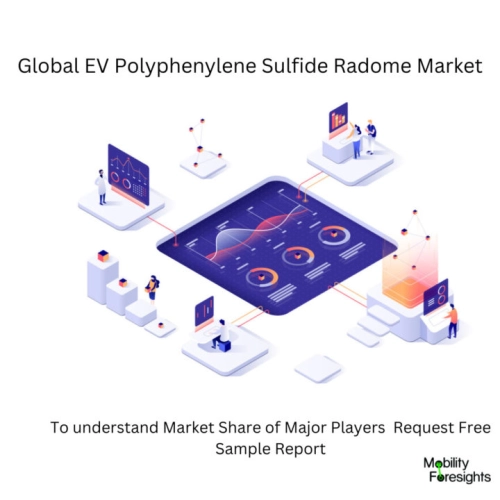
- Get in Touch with Us

Last Updated: Apr 25, 2025 | Study Period: 2023-2030
EV Polyphenylene sulfide (PPS) radome is an organicpolymerconsisting ofaromaticrings linked bysulfides.Synthetic fiberandtextilesderived from this polymer resistchemicaland thermal attack.
PPS is used infilterfabric forcoal boilers,papermaking felts,electrical insulation,film capacitors, specialtymembranes,gaskets, andpackings. PPS is the precursor to aconductive polymerof thesemi-flexible rod polymerfamily.
The PPS, which is otherwise insulating, can be converted to thesemiconductingform byoxidationor use ofdopants. Polyphenylene sulfide is anengineering plastic, commonly used today as ahigh-performance thermoplastic. PPS can be molded, extruded, or machined to tight tolerances.
In its pure solid form, it may be opaque white to light tan in color. Has a specific Maximum service temperature. PPS has not been found to dissolve in any solvent at temperatures below.PPS is one of the most important high temperature thermoplastic polymers because it exhibits a number of desirable properties.
These properties include resistance to heat,acids,alkalies,mildew,bleaches,aging,sunlight, andabrasion. It absorbs only small amounts of solvents and resistsdyeing.
PPS is marketed by different brand names by different manufacturers. The major industry players areChina Lumena New Materials,Solvay,Kureha,SK Chemicals,Celanese,DIC Corporation,Toray Industries, Zhejiang NHU Special Materials,SABIC, andTosoh.
Other manufacturers include Chengdu Letian Plastics, Lion Idemitsu Composites, and Initz (a joint venture of SK Chemicals andTeijin).

The Global EV polyphenylene sulfide radome market accounted for $XX Billion in 2022 and is anticipated to reach $XX Billion by 2030, registering a CAGR of XX% from 2023 to 2030.
Rayton PPS radome - Ryton polyphenylene sulfide (PPS) radome is a semi-crystalline, high-heat polymer that offers exceptional dimensional stability for precision-molded components needing to withstand prolonged, high-temperature service. It is inherently flame retardant and offers chemical resistance comparable to PEEK and fluoropolymers.
In Automotive, Ryton PPS radome is used in components required to withstand high temperatures, mechanical stress and corrosive automotive fluids. By replacing metal, Ryton® PPS reduces fuel consumption, lowers costs and improves system integration.
In Electrical/Electronic, Ryton PPS radome meets performance requirements for connectors, sockets, relays and switches, bobbins and coils, electronic packaging, and encapsulated devices.
For Appliances, Ryton PPS radome is used to replace metals, thermosets, and lower performing plastics in motors and controls, pumps, fans and blowers, and E/E components used in HVAC and other demanding applications.
| Sl no | Topic |
| 1 | Market Segmentation |
| 2 | Scope of the report |
| 3 | Abbreviations |
| 4 | Research Methodology |
| 5 | Executive Summary |
| 6 | Introduction |
| 7 | Insights from Industry stakeholders |
| 8 | Cost breakdown of Product by sub-components and average profit margin |
| 9 | Disruptive innovation in the Industry |
| 10 | Technology trends in the Industry |
| 11 | Consumer trends in the industry |
| 12 | Recent Production Milestones |
| 13 | Component Manufacturing in US, EU and China |
| 14 | COVID-19 impact on overall market |
| 15 | COVID-19 impact on Production of components |
| 16 | COVID-19 impact on Point of sale |
| 17 | Market Segmentation, Dynamics and Forecast by Geography, 2023-2030 |
| 18 | Market Segmentation, Dynamics and Forecast by Product Type, 2023-2030 |
| 19 | Market Segmentation, Dynamics and Forecast by Application, 2023-2030 |
| 20 | Market Segmentation, Dynamics and Forecast by End use, 2023-2030 |
| 21 | Product installation rate by OEM, 2023 |
| 22 | Incline/Decline in Average B-2-B selling price in past 5 years |
| 23 | Competition from substitute products |
| 24 | Gross margin and average profitability of suppliers |
| 25 | New product development in past 12 months |
| 26 | M&A in past 12 months |
| 27 | Growth strategy of leading players |
| 28 | Market share of vendors, 2023 |
| 29 | Company Profiles |
| 30 | Unmet needs and opportunity for new suppliers |
| 31 | Conclusion |
| 32 | Appendix |